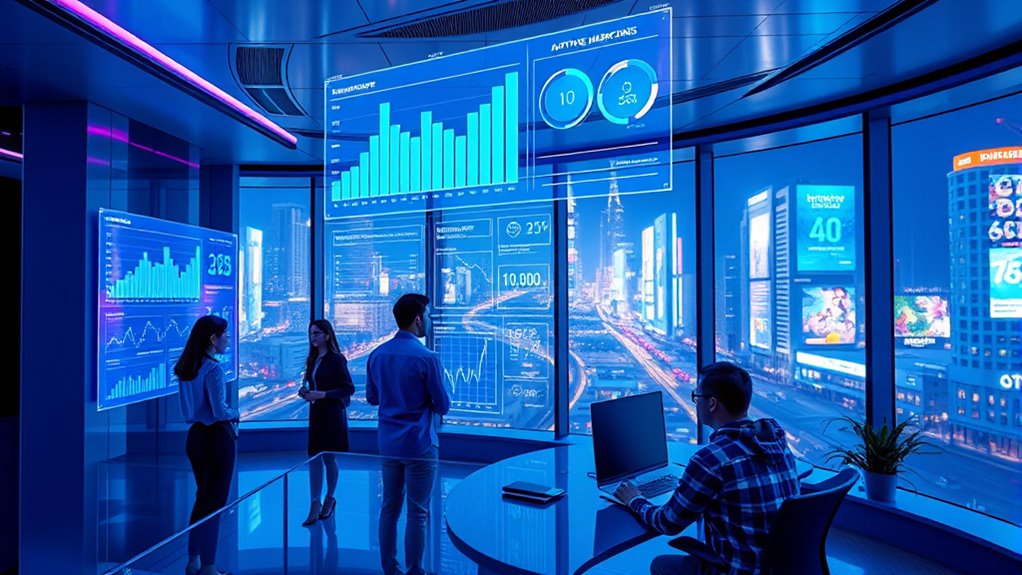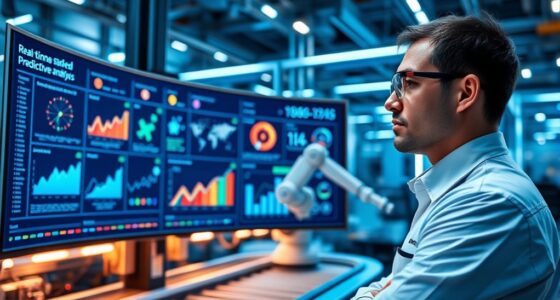By 2025, marketing automation will harness advanced AI and predictive analytics to deliver hyper-personalized, real-time experiences across multiple channels. You’ll be able to anticipate customer needs, tailor content instantly, and optimize campaigns with minimal manual effort. This strategic edge helps strengthen relationships and stay competitive in a fast-evolving digital landscape. If you keep exploring, you’ll discover how these innovations can transform your marketing success even further.
Key Takeaways
- AI-driven personalization will enable real-time content adaptation, enhancing customer engagement and relevance.
- Predictive analytics will proactively identify high-value prospects and optimize resource allocation.
- Seamless, anticipatory customer experiences will integrate behavior analysis for instant tailored interactions.
- Campaign workflows will be highly automated, allowing precise audience segmentation and multi-channel triggers.
- Advanced marketing tools will provide a strategic edge, fostering stronger relationships and maintaining competitiveness.

As we approach 2025, marketing automation continues to transform how businesses connect with their audiences. You’re likely noticing that AI personalization is now a core component of many marketing strategies. Instead of generic messages, you’re able to deliver tailored content that resonates with individual preferences and behaviors. Thanks to advances in AI, your campaigns can now adapt in real-time, making every interaction feel more relevant and engaging. This level of personalization isn’t just about inserting a name into an email anymore; it involves deep learning models analyzing vast amounts of data to predict what your audience wants before they even realize it themselves.
AI-driven personalization predicts customer needs, making interactions more relevant and engaging beyond basic customization.
Predictive analytics plays a pivotal role in this evolution. With it, you can forecast future customer actions based on historical data, enabling your marketing efforts to be more proactive than reactive. Instead of waiting for a customer to make a purchase, you can identify those who are most likely to convert and target them with specific offers or content. This strategic approach helps optimize your marketing budget by focusing resources where they’re most effective. Additionally, predictive analytics helps you uncover patterns and trends that might otherwise go unnoticed, giving you a competitive edge in understanding customer needs and adjusting your messaging accordingly.
By integrating AI personalization and predictive analytics into your marketing automation tools, you’re empowered to create seamless customer experiences. For example, as someone browses your website, AI algorithms analyze their behavior and preferences, tailoring on-site content and product recommendations instantly. Simultaneously, predictive analytics can anticipate when a customer might be ready for an upsell or renewal, prompting timely outreach that feels intuitive rather than intrusive. This dynamic responsiveness elevates your brand’s relevance and builds stronger relationships with your audience.
Furthermore, these technologies streamline your workflows. Automated systems can segment audiences more precisely, craft personalized content at scale, and trigger multi-channel campaigns based on real-time insights. You don’t have to manually manage every touchpoint; instead, your marketing automation platform handles the heavy lifting, allowing you to focus on strategic planning and creative development. As a result, your campaigns become more efficient and effective, generating higher engagement and conversion rates.
In essence, the combination of AI personalization and predictive analytics in marketing automation by 2025 means you’re always one step ahead. You’re not just reacting to customer behaviors but anticipating them, delivering the right message at the right time through the right channel. This shift isn’t optional anymore; it’s essential for staying competitive in a rapidly evolving digital landscape. Embracing these technologies now positions you to build stronger, more personalized relationships that drive long-term growth and loyalty. Incorporating email marketing tools with advanced features will further enhance your capacity to execute these strategies effectively.
Frequently Asked Questions
How Will AI Influence Personalized Marketing Automation Strategies?
AI will revolutionize your personalized marketing automation strategies by enhancing predictive analytics, allowing you to anticipate customer needs more accurately. It enables emotional targeting, helping you craft messages that resonate deeply with your audience’s feelings. With AI, you’ll deliver highly tailored content at the right moment, boosting engagement and conversions. This technology makes your campaigns smarter, more intuitive, and ultimately more effective in building lasting customer relationships.
What Are the Ethical Considerations for Automated Customer Data Usage?
Think of customer data as a delicate garden—you must tend it with care. You need strict Data Privacy measures and transparent Consent Management to avoid trampling on trust. Ethically, you respect boundaries, avoid manipulative tactics, and prioritize customer control over their information. By nurturing these principles, you guarantee your automated strategies grow ethically, cultivating loyalty rather than eroding it.
How Can Small Businesses Leverage Automation Effectively in 2025?
You can leverage automation effectively by using small business tools designed for your needs and budget strategies that maximize ROI. Focus on automating routine tasks like email marketing, social media posting, and customer follow-ups. This allows you to save time and personalize customer experiences. Regularly analyze performance metrics to refine your approach, ensuring your automation efforts align with your business goals and help you grow efficiently without overspending.
Will Automation Replace Human Marketers Entirely by 2025?
Automation won’t replace human marketers entirely by 2025. You’ll still need creative storytelling and emotional branding to connect with your audience genuinely. While automation handles repetitive tasks and data analysis, your unique insights, empathy, and creativity propel authentic engagement. Use automation to free up time for crafting compelling stories that resonate emotionally. This blend ensures your marketing remains personal, impactful, and highly effective—something automation alone can’t achieve.
What New Metrics Will Define Success in Marketing Automation?
You’ll find success in marketing automation by focusing on new metrics like customer engagement and conversion rates. These metrics show how well your campaigns resonate and turn prospects into customers. You’ll track engagement through interactions and personalized touchpoints, while conversion rates measure how effectively your automation transforms leads into sales. By prioritizing these, you can optimize strategies and ensure your automation efforts drive meaningful results.
Conclusion
By 2025, marketing automation will be your secret weapon, turning complex data into personalized experiences that feel like they’re written just for your audience. As you harness smarter AI and seamless integrations, you’ll stay ahead of the curve—like a surfer riding the perfect wave. Embrace these innovations now, and you’ll transform your marketing efforts into a well-oiled machine, driving growth effortlessly and confidently into the future.









